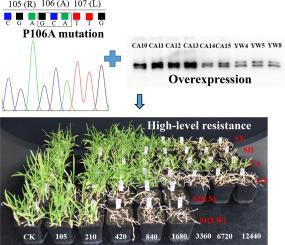当前位置:
X-MOL 学术
›
Pestic. Biochem. Phys.
›
论文详情
Our official English website, www.x-mol.net, welcomes your feedback! (Note: you will need to create a separate account there.)
Glyphosate resistance in Eleusine indica: EPSPS overexpression and P106A mutation evolved in the same individuals
Pesticide Biochemistry and Physiology ( IF 4.7 ) Pub Date : 2020-03-01 , DOI: 10.1016/j.pestbp.2020.01.014 Jingchao Chen , Hongjuan Huang , Shouhui Wei , Hailan Cui , Xiangju Li , Chaoxian Zhang
Pesticide Biochemistry and Physiology ( IF 4.7 ) Pub Date : 2020-03-01 , DOI: 10.1016/j.pestbp.2020.01.014 Jingchao Chen , Hongjuan Huang , Shouhui Wei , Hailan Cui , Xiangju Li , Chaoxian Zhang

|
Goosegrass is one of the most widespread weeds in orchards and tea plantations in China, and glyphosate is a popular herbicide used to control it. However, high glyphosate selection pressure has led to some populations becoming resistant. The objectives of this research were to determine resistance levels and possible resistance mechanisms of goosegrass populations from several tea plantations in Zhejiang Province in China. The resistance indexes in four goosegrass populations (SH, SY, CA and CX) ranged from 4.9 to 13.4, and lower shikimate accumulation in these populations compared with a glyphosate-susceptible (GS) population confirmed their resistance to glyphosate. No mutations in the target gene EPSPS were found in populations SH and SY, however, the expression of EPSPS in these two populations was 9.3 and 29.7 times higher than that in the GS population, respectively. In the CX population, a P106S mutation in EPSPS was found in 6.7% of the individuals and another 80.0% of individuals had EPSPS amplification. In population CA, all the individuals had a P106A mutation and 86.7% of them had amplification in EPSPS. The EPSPS copy numbers ranged from 5.2 to 62.3 in these four resistant populations. There was a positive correlation between signal intensities of primary anti-EPSPS antibody and the copy number of the EPSPS protein, as indicated by immunoblot analysis. In population CA, with high-level resistance to glyphosate, both P106A mutation and amplification in EPSPS evolved in the same individuals in this population.
更新日期:2020-03-01


























 京公网安备 11010802027423号
京公网安备 11010802027423号